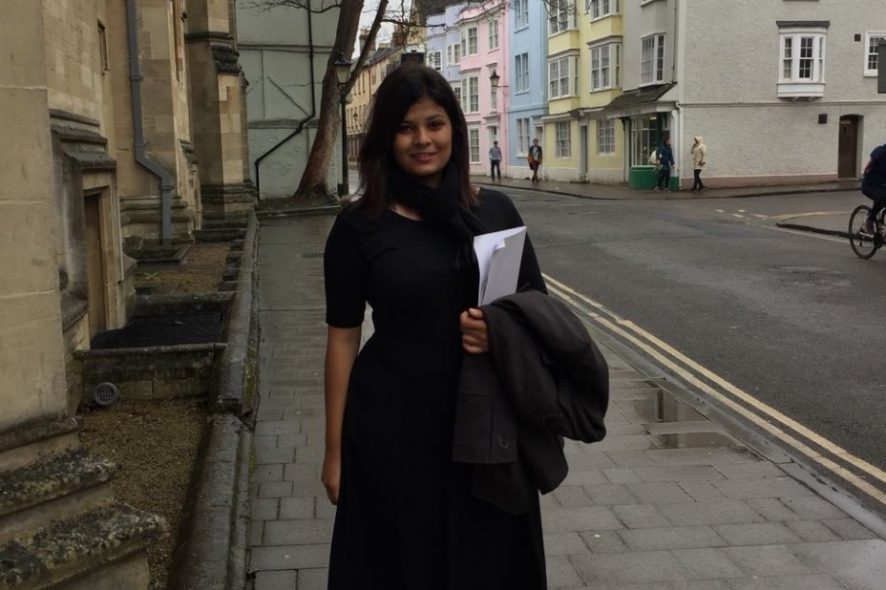-
Please introduce yourself and your areas of interest ?
My name is Shreya and I am a final year student of Law studying at Rajiv Gandhi National University of Law, Punjab.
Through the course of the past three years at least, I have tried to keep my study focused to Infromation Technology, Media and Communication Laws, which is also the field I will be specialising in at LSE.
Outside of work, I love poetry and travelling. So an ideal weekend for me would be reading Rumi on a hilltop.
-
What has motivated you to pursue LLM in the field of Media and Communications Law?
Well primarily, my motivation stems from my deep-rooted interest in this field. I started preparing for the Oxford Price Media Moot Court Competition sometime early in 2017 and ever since, I’ve been glued to aspects of Media Law. Thankfully for me, this field is also becoming exceedingly relevant – what with the advent of Social Media bringing with itself multiple factes of intermediary liability, data-protection and privacy issues.
India has the highest number of facebook users in the world, the second highest number of twitter users in the world and is the fastest growing community on YouTube. Even so, there is very limited research being carried out in these fields. Hence, I started seeking opportunities, national and international, that were congruent with my research interests in Media Law and an LLM seemed to be the perfect stepping stone.
-
When is the ideal time to set your mind on pursuing LLM. How did you decide on the college?
I’d say that the ideal time to SET your mind for anything is only once you’ve dipped your fingers to test waters in every other thing you think you could be interested in. I personally did research-based internships, corporate internships, litigation internships and also worked with a couple of NGOs. Of these, I was most interested in research and academia. Naturally, I took up a lot of research positions in and out of college. The decision to pursue an LLM was with the intention to further refine my skillset.
Deciding on the colleges was a tough one. I made an analysis chart for each college and my main reasons for settling down with the London School of Economics and Political Science as my first preference were:
-
The amount of research work they carry out – This was because I want to be part of Media law research centers that contribute on a macro-scale. LSE’s Media research hub has assisted the UK government with its Data Protection Act, 2018 and is consistently working and analysing the EUGDPR (European Union’s General Data Protection Regulation). Hence, LSE seemed ideal in this department.
-
The Faculty – LSE has some brilliant faculty teaching the subjects that I am most interestd in such as ‘Regulating media publications’. The courses and faculty were a perfect match to my interests.
-
Miscellaneous – This included the city, cultural diversity and employment opportunities. LSE checked all the right boxes for me.
-
Tell us something about the timeline of the application and the commitment it requires?
I started working seriously on my application somewhere in October, 2018 for submissions I had to send out in January, 2019. However, I know colleagues who started working much before that. So honestly, applications are a lot about bringing together all of the relevant work you have done (based on your choice of specialisation) and putting it in one place. My Letter of Recommendations were by two teachers in college – one of whom had taught me most and the other with whom I had worked most closely when organising conferences and seminars. I think this made a huge difference to my application because they were able to write about me without reservations.
Ofcourse, the application requires a lot of commitment given that it is an extremely competitive process.
-
What should be kept in mind while writing SOPS, essays etc. ? What according to you made your application stand out?
SOPs always require consistent work. I know people who engaged agents to write their SOPs but in my honest opinion, nobody can tell your story better that you. Having said that, I had atleast over 15 drafts of my SOP which I ran by everybody I thought would help me make it better. At one point I started making non-legal persons read it and asked them at the end of their reading whether they’d want to meet the stranger who’s written that.
A lot of people tend to make their SOPs an essay version of their CV, which can be fatal for your application. SOPs should be a slice of your life. The slice that has a right mix of your interests, hobbies, passions, goals. It should not only talk about why that institution is the best for you, it should also address why you are an ideal candidate for that institution.
I think my application stood out because it said a story. A reader would be able to draw a timeline of how my interest in Media Law grew because of both my personal and professional experiences. That, along with the variety of work I had done in the field was helpful in making my application a strong one. Needless to say, I was lucky in getting strong recommendations from my professors and that acted as an obvious catalyst.
-
What are your future aspirations? How important in your opinion is legal research?
I would say Legal research is the single-most important tool to making better laws. Which is why, after my LLM, I intend on working in Media policy-research and assist in Indian Policy-making. I am also the co-founder of an NGO named ‘Jaago’ which seeks to increase legal literacy in the grass-roots of India. I, along with my co-founder intend to increase its bandwith to states other than Punjab, Delhi and West Bengal.
-
Messages to all other LLM aspirants.
My message to all LLM aspirants would be to:
First, have their homework in place before they get started. This means that they should know where they want to go, why they want to go there and where in their order of preference would that place rank.
Second, the sooner you start on your SOP, the more edits it’ll go through, the better. Not to say that if you’ve started late, you’re not making it. Its just that you have to put in the hours. Whether those hours are spread through the course of 6 months or 2, it doesn’t matter. The more hours you put in, the better your application will get.
Third, get good recommenders. In my experience, your relationship with your recommendor matters more than their designation. In essence, I’d suggest you rather get a recommendation from a faculty member who taught you for 3 years than the Registrar of your college who has not taught you any subject(s). But then again, to each their own!
If you think I could be of any further help, feel free to reach out at tewarishreya@hotmail.com.
All the very best!! The inertia to get started can be the worst of it. But who got anywhere without stepping out of their comfort zone?







